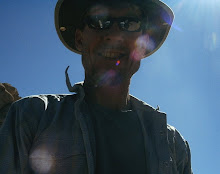I'm discovering bicycles at the edge of the picture. Bicycles among the collection of props, not even in focus enough to be minor characters, nearly glanced over. But if it's true that poetry is language distilled to what is essential, and the bicycle made the cut, then its evocative presence speaks of intent. Even at rest, the bicycle is symbol.
Here are two poems where the bicycle is metaphor for what remains when the distillation is complete.
Self-Portrait as the Bootblack in Daguerre's Boulevard du Temple
by Robin Coste Lewis
(An erasure of Grant Allen's Recalled to Life)
I don't believe
I thought
or gave names
in any known language
I spoke
of myself always
in the third person.
What led up to it,
I hadn't the faintest idea.
I only knew the Event
itself took place. Constant
discrepancies. To throw them
off, I laughed,
talked--all games
and amusements--to escape
from the burden of my own
internal history.
But I was there
trying for once
to see you,
longed so
to see you.
I might meet you
in the street:
a bicycle leaning
up against the wall
by the window. Rendered
laws of my country
played before my face.
Historical, two-souled,
forgotten, unknown
freaks of memory.
The matter of debts,
the violent death
of a near relation,
and all landing
at the faintest conception.
Dark. Blue. And then.
All I can remember
is when I saw you.
It was you
or anyone else.
The shot
seemed to end
all. It belongs
to the new world:
the Present
all entangled, unable
to move. Everything
turned round
and looked
at you.
Robin Coste Lewis won the National Book Award for poetry in 2015 for her book Voyage of the Sable Venus. Below is Daguerre's photograph referenced in the title. It dates from 1838 and is believed to be the first photograph that captures the image of a person.
Forgetfulness
by Billy Collins
The name of the author is the first to go
followed obediently by the title, the plot,
the heartbreaking conclusion, the entire novel
which suddenly becomes one you have never read, never even heard of,
as if, one by one, the memories you used to harbor
decided to retire to the southern hemisphere of the brain,
to a little fishing village where there are no phones.
Long ago you kissed the names of the nine Muses goodbye,
and watched the quadratic equation pack its bag,
and even now as you memorize the order of the planets,
something else is slipping away, a state flower perhaps,
the address of an uncle, the capital of Paraguay.
Whatever it is you are struggling to remember
it is not poised on the tip of your tongue,
not even lurking in some obscure corner of your spleen.
It has floated away down a dark mythological river
whose name begins with an L as far as you can recall,
well on your own way to oblivion where you will join those
who have even forgotten how to swim and how to ride a bicycle.
No wonder you rise in the middle of the night
to look up the date of a famous battle in a book on war.
No wonder the moon in the window seems to have drifted
out of a love poem that you used to know by heart.

